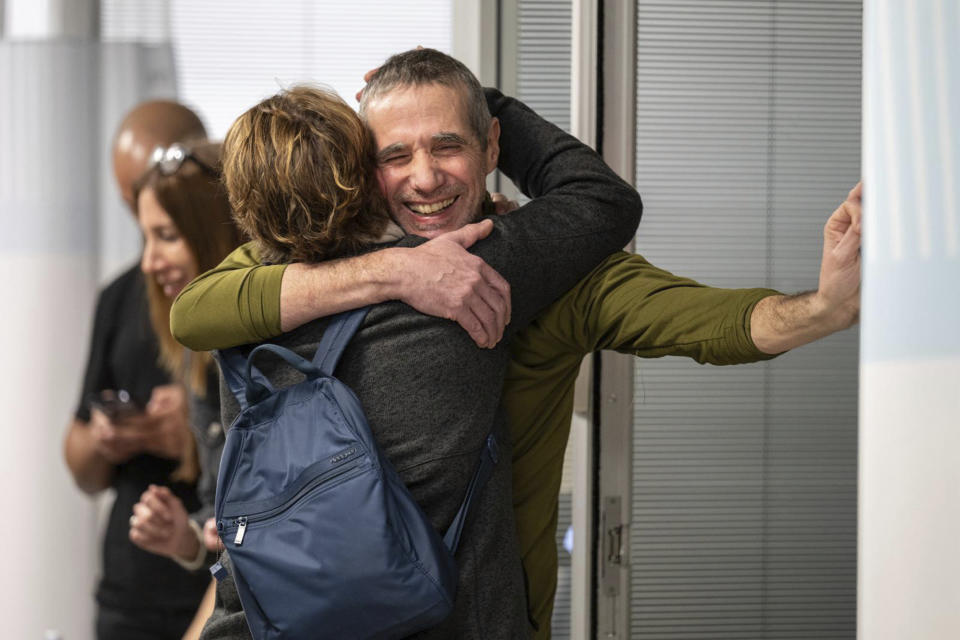Nightmare In Gaza: Families Of Hostages Endure Prolonged Ordeal

Table of Contents
The Human Cost of the Gaza Hostage Crisis
The Gaza hostage crisis has exacted a devastating toll on families, extending far beyond the physical separation from their loved ones. The emotional and psychological impact is profound and long-lasting.
Emotional Toll on Families
The emotional weight carried by these families is immeasurable. The constant fear, gnawing anxiety, and crippling uncertainty about their loved ones' fate are taking a heavy toll. The lack of information fuels a cycle of grief, despair, and anger.
- Sleep deprivation: The constant worry prevents many from sleeping soundly, leading to exhaustion and further mental distress.
- Strained family relationships: The pressure of the crisis puts intense strain on family dynamics, leading to arguments and fractured relationships.
- Financial hardship: With the breadwinner often taken hostage, families face severe financial difficulties, struggling to meet basic needs.
- Mental health challenges: Many are experiencing severe mental health issues, including PTSD, depression, and anxiety, requiring urgent professional support.
One mother, whose husband has been missing for weeks, described her daily existence as "living in a perpetual state of dread." These personal anecdotes illustrate the deep human suffering behind the headlines.
Lack of Information and Communication
The lack of reliable information about the hostages is a particularly cruel aspect of this crisis. Families are left desperate for any news, grappling with conflicting reports and rumors.
- Limited or no contact: Many families haven't had any contact with their loved ones since their capture.
- Conflicting reports: Inconsistent information from various sources fuels confusion and deepens the sense of despair.
- Lack of transparency: The lack of transparency from authorities further exacerbates the families' frustration and anxiety.
- Frustrating bureaucratic processes: Attempts to obtain information are often met with bureaucratic hurdles and delays.
This information vacuum compounds the emotional distress, leaving families feeling abandoned and powerless.
The Struggle for Justice and Accountability
The families of the Gaza hostages are not simply enduring; they are actively fighting for justice and accountability. Their demands are clear: the safe and unconditional release of their loved ones, and justice for the ordeal they've been subjected to.
Demands for Release and Safe Return
Families are employing various methods to pressure for the release of their loved ones.
- Peaceful protests: Many have participated in peaceful demonstrations, calling for the release of the hostages.
- Appeals to international organizations: Families are appealing to international bodies like the UN and the Red Cross to intervene.
- Pressure on governments: They are lobbying their governments to exert diplomatic pressure for the release of the hostages.
- Media campaigns: Families are using media campaigns to raise global awareness of their plight and to increase pressure on those holding their loved ones.
International Involvement and Humanitarian Aid
International organizations and governments play a critical role in mediating the crisis and providing aid to affected families.
- Negotiations: International actors are engaged in delicate negotiations to secure the release of the hostages.
- Humanitarian aid distribution: Organizations are providing essential supplies like food, water, and medical care.
- Medical support: Mental health services and other medical assistance are crucial to addressing the trauma experienced by families.
- Legal assistance: Legal support is vital in navigating the complex legal processes involved in securing the release of hostages.
- Advocacy efforts: International bodies are advocating for the rights of the families and working towards a peaceful resolution.
The Daily Reality of Life Under Siege
The hostage crisis is not an isolated incident; it is occurring against the backdrop of a broader humanitarian crisis in Gaza. The ongoing siege compounds the challenges faced by the families.
Living with Uncertainty
The daily lives of these families are defined by pervasive uncertainty and fear.
- Fear of further violence: The threat of further violence looms large, adding to the daily anxieties.
- Restrictions on movement: Movement restrictions hamper their ability to access essential resources and support networks.
- Access to basic necessities: The blockade limits access to basic necessities like food, water, and medicine.
- Economic hardship: The ongoing conflict and blockade have created widespread economic hardship.
- Lack of infrastructure: The already fragile infrastructure in Gaza is further strained, impacting access to services.
The Impact on Children
Children are particularly vulnerable in this crisis, suffering profound emotional and psychological trauma.
- Educational disruption: The conflict disrupts their education, hindering their development.
- Emotional distress: Witnessing the suffering of their parents and the ongoing violence deeply impacts their emotional well-being.
- Psychological trauma: Many children are developing PTSD and other mental health issues requiring specialized care.
- Loss of parental care and guidance: The absence of parents leaves children without the necessary care, guidance, and support.
Conclusion
The "Nightmare in Gaza" hostage crisis is a devastating illustration of the human cost of conflict. The families of the hostages are enduring unspeakable suffering, grappling with fear, uncertainty, and the crushing weight of prolonged separation from their loved ones. This crisis demands urgent international attention and action. The lack of information, the emotional toll on families, and the broader humanitarian context highlight the urgency of the situation.
Let's act now to End the Nightmare in Gaza. Share this story, support humanitarian efforts, contact your representatives to demand action, and help raise awareness about the plight of these families. Demand justice for Gaza hostages and support Gaza families in this desperate hour. Let’s work together to bring these families peace and reunite them with their loved ones.

Featured Posts
-
 Megalos Kataklysmos Mesogeioy Apokalyptontas Tin Alitheia Gia Tin Katastrofi
May 13, 2025
Megalos Kataklysmos Mesogeioy Apokalyptontas Tin Alitheia Gia Tin Katastrofi
May 13, 2025 -
 Cuando Y Donde Ver Atalanta Vs Lazio Serie A 2025
May 13, 2025
Cuando Y Donde Ver Atalanta Vs Lazio Serie A 2025
May 13, 2025 -
 Hannover 96 Stimmung Drohkulisse Und Das Fehlende Derby In Der 2 Liga
May 13, 2025
Hannover 96 Stimmung Drohkulisse Und Das Fehlende Derby In Der 2 Liga
May 13, 2025 -
 Kanika House The Delhi Bungalow Where Br Ambedkar Drafted The Indian Constitution
May 13, 2025
Kanika House The Delhi Bungalow Where Br Ambedkar Drafted The Indian Constitution
May 13, 2025 -
 Doom The Dark Ages Early Access Release Date Time And Preload Guide
May 13, 2025
Doom The Dark Ages Early Access Release Date Time And Preload Guide
May 13, 2025
